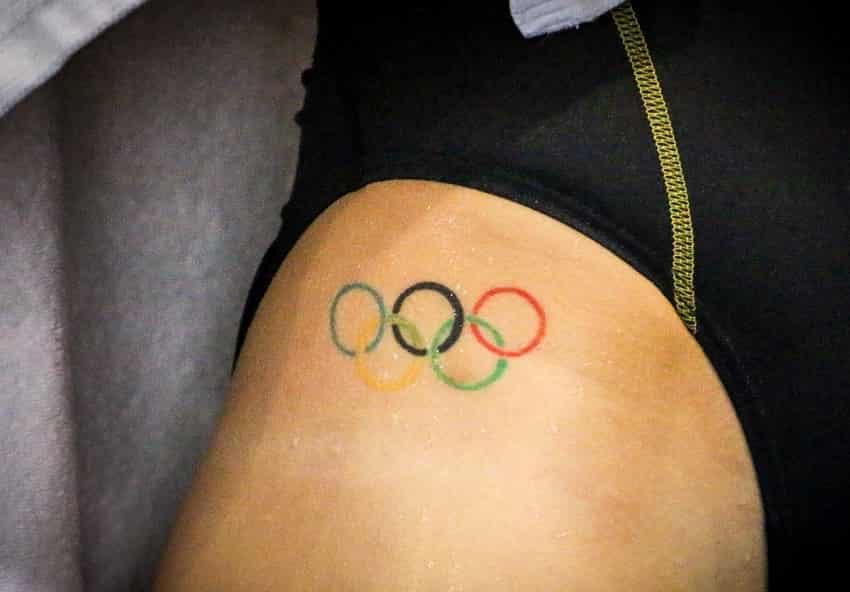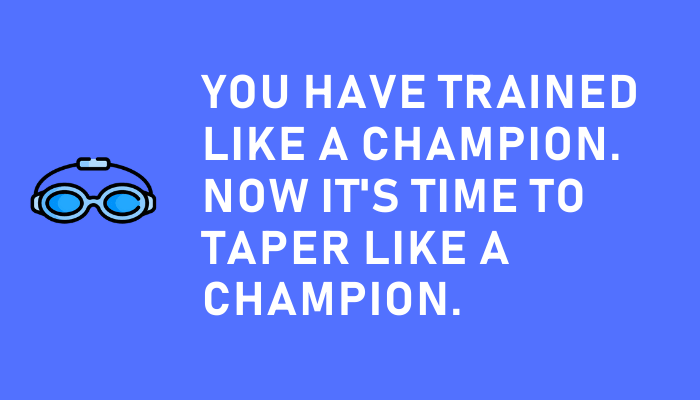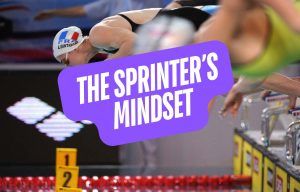Taper.
For some swimmers, it is a six-pack of sweet relief.
For others, it’s a mystifying, infuriating, something else-ing process that cracks and shatters the confidence required to swim like a certified beast on race day.
- What if I didn’t work hard enough?
- But my last taper went better?
- But I was also training less?
- Why aren’t I feeling better in the water?
- Why are my teammates already nearly going PB’s in practice and it feels like I am trying to swim through moldy Jell-O?
A swimmer’s mindset unraveling isn’t uncommon during taper.
After all, the hard work has been completed. You’ve made the deposits into your training, and now it’s time to see what all that effort and hard work is worth! No pressure, right?
Ultimately, your taper is all about sharpening and resting.
The hard work has been cast, now it’s all about sharpening all that effort and training into a finely-tuned, super-fast performance.
You’ve trained like a champion, now it’s time to taper like a champion.
Sleep, sleep, sleep
With reduced training, later starting times (hopefully!), and fewer workouts, it is time to soak up the rest like a cotton swimmer’s towel.
Getting more sleep is something you should be doing anyway. As a high-performance athlete, tucking in and locking down lots of sleep should be at the top of your priority list when it comes to lifestyle.
Taper gives you a chance to really get on top of it. With a drop in volume you should find yourself with a shade more time each day to get the Z’s. Take advantage of it.
Getting more sleep is the best (and most enjoyable!) way to bring your hard work to fruition.
The improvement you will get from sleep extension is no joke.
(Some fun research at Stanford found that getting an extra 1-2 hours of sleep helped their swimmers drop half a second on their time to 15m over the span of six weeks.)
The supercompensation coming your way should be pretty dang awesome if you give yourself a chance to fully recover from the hard work you have done.
The problem with comparing this taper to your last taper
It’s natural to look back on previous tapers and benchmark yourself according to past performances.
- “By day nine, I expect to be feeling PB-ready!”
- “I don’t remember feeling this sore last time I was tapering…”
- “I know I was going faster at this point the last time we were headed into a championship meet…”
These expectations can be tricky, because your swimming, and everything that encapsulates it, is evolving.
You aren’t the same swimmer as you were a year ago.
The basis for this post was an email I received from a swimmer, in his first year in NCAA division 1 swimming, who was training significantly more than at the same time last year.
In moments like this it is unhelpful to compare specifics. How you felt a year ago and focusing on the specifics of what you were doing then doesn’t really matter.
Stick to the same general things that got you good results in the past—eating well, staying on top of schoolwork, sleeping lots, managing stress, and unplugging when away from the pool. Those things–the parts of your process–are what will push you towards maximizing your hard work. Not obsessing over past tapers and comparing times and how you felt at which point.
Comparing this season to last, or this taper to the last one, is problematic and basically pointless because your training and your body are different. I know, not comparing yourself to your past self is easier said than done, but remind yourself that it’s not a fair comparison.
Focus instead of maximizing your rest and preparation each day, of maximizing each step of the process of tapering, and the performances will take care of themselves.
If you still worry about over-thinking your taper on race day:
- Have a simple process for race day that includes performance cues that are simple and vague. “Easy speed!” for the first 25, “Accelerate!” on the third 25, “Hulk smash!” coming down the final home stretch.
- Unplug from the sport when you are away from the pool. Left to our own devices, we overthinkers tend to run ourselves into the ground mentally when the sport follows us home.
- Future journaling your anxieties and fears is another helpful tactic for lending perspective to what you are going through.
It’s a new taper, a new experience, and a chance for you to learn how your body will respond. Enjoy it and take the process one step at a time!













